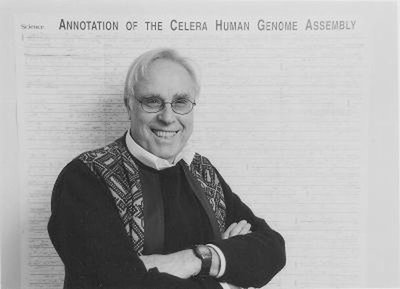May 16, 2002
Genes and aging
Pamela Wyngate
HS News & Community Relations
The good news is, people live longer. The bad news is, there are still many things that can go wrong as a result of the aging process.
Dr. George M. Martin, professor of pathology and adjunct professor of genome sciences, has been researching the pathobiology of aging for over 40 years. Martin, who is also the founding director of the UW Alzheimer’s Disease Research Center (ADRC), uses genetic methods and approaches, including the investigation of rare “experiments of nature” that have the potential to inform us about processes of aging in human beings.
These studies have led to the discovery of the molecular basis of Werner syndrome, a recessive genetic disease that results in the premature development of numerous disorders of aging, and the mapping of dominant genes causing early-onset dementias of the Alzheimer type. His lab is currently involved in studies of an adaptor or “scaffold” protein (FE65) that is involved in modulating the deposits of the type of amyloid found in the brains of Alzheimer victims.
Martin presents “Gene Action in the Pathobiology of Aging” at the Distinguished Scientist Science in Medicine Lecture at noon, Thursday, May 23, in A-420 Hogness Auditorium, Health Sciences Center. The lecture will review his new classification of the nature of gene action that underlies the evolutionary biological theory of aging. Everyone is welcome.
This is the final lecture in the 2001-2002 Science in Medicine series. The next series begins in fall quarter 2002.
Martin attended the UW, where he earned a B.S. in chemistry in 1949 and a M.D. in 1953. During medical school he participated in now-Professor Emeritus of Medicine Belding Scribner’s early research in the management of fluid and electrolyte balance. Martin completed an internship at Montreal General Hospital in Canada in 1954-55. From 1955 to 1957 he was a resident and then an instructor of pathology at the University of Chicago.
Martin returned to the UW as a pathology instructor in 1957. After serving as an U.S. Public Health Service research fellow at Glasgow University in Scotland, he became the founding director of UW Medical Center’s Cytogenetics Laboratory in 1962. He became a full professor in 1968. He has also been an attending pathologist at UW Medical Center since 1959.
Among numerous awards and honors, Martin will become the president of the Gerontological Society of America (GSA) and receive the 2002 Ipsen Foundation Longevity Prize at the GSA annual meeting in November. The Ipsen Longevity Prize was created in 1996 to honor researchers who have made outstanding contributions in the field of longevity. Martin is also the author of more than 300 articles and book chapters and currently serves as editor-in-chief of Science of Aging Knowledge Environment (SAGE KE), a Web site sponsored by Science magazine. He is a senior member of the Institute of Medicine of the National Academy of Sciences.



